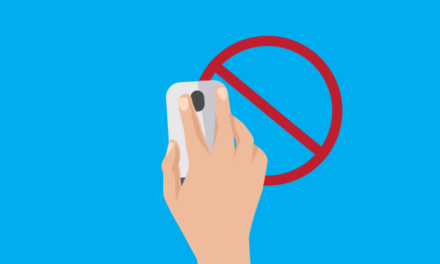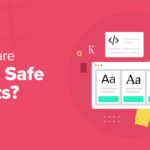When it comes to domain registration, there are some dos and don’ts of how to go about it properly. This article shows you what you need to know to lead you to a good domain name.
It goes without saying, choosing a domain name is a crucial decision. After all, it’s your website’s calling card that you want to be attractive, relevant, and effective. It can boost SEO, increase your brand awareness, and raise the number of site visitors when created well.
A good domain establishes authority and credibility, reinforces brand identity, and promotes your business. On top of that, you want to ensure it’s safe!
This article covers the Dos and Don’ts of domain registration to help ensure your domain name is top-notch and sets up your site for success.
We’ll cover:
- Dos
- Don’ts
After reading this article, you should know… wait for it… what to do.
Dos
Pick Correct Domain Extension
Deciding upon the perfect Domain Extensions, aka TLDs (top-level domains), will affect your online presence and overall business.
Beyond .com, there are numerous other domain extensions available. Everything from .edu, .gov, .blog – and plenty more. Each extension can be used to associate with your brand (e.g. .org is great for organizations).
Pick a domain extension related to your business, organization, or personal site – whatever it may be. This lets readers know what your website is about from the very beginning.
A safe bet is typically .com if you can’t decide on other extensions that might be more beneficial. It’s the most popular extension and is recognized universally.
However, go with your niche if you want to be more specific.
Make It Easy and Foolproof
Don’t go crazy and make a domain that’s hard to type or not easy to remember. Be sure to make it foolproof because, well, typos happen to the best of us.
If you choose a domain that’s different or painful to type, it will hurt your business and brand.
Misspelled domains lead visitors to the wrong site, 404 errors, and frustration. If you’re lucky, they may try again to find your website. But, chances are, they’ll give up and you lose a visitor.
Avoid slang (“4” instead of “for”), and don’t use words with numerous spelling options. Don’t mix numbers with words, avoid abbreviations, and don’t use homonyms (e.g. “write” and “right”).
In a nutshell, use common vocabulary, and make it easy to spell and type – without the user having to think about it too much.
Make Sure It’s Registered In Your Name or Business
When registering domain names, you often don’t second guess the registration process and may overthink what name to put it under. However, it’s essential to put it under your name or business — depending on your purpose.
This ensures that you’ll have control over it for the long term. You can keep or sell it as long as you want.
If it’s under someone else, you may have to buy it from an individual or company. It’s best to ensure you’re in control right from the start.
Make a Memorable Impression
Making a good first impression is important and easy to do with a good domain. There are just a few things you should do. After all, your domain will be out there in the ether with millions of others, so it’s important to be seen amongst the competition.
One is to make it unique – so it stands out. Whatever your domain is, having it be unique and memorable is a key factor. Something catchy is especially important (e.g. boredpanda, JoeKnowsCoffee).
Think of one of your favorite websites. Does it have a catchy title? Chances are, it does.
Also, it’s best to keep a domain as short as possible; however, if a longer domain makes yours stick out and “pop”, it may be worth doing.
Use Keywords
Like domain extensions, Keywords in your domain name help tell visitors what your website is about.
An example might be if you run a WordPress development agency, insert ‘agency’ and ‘WordPress’ (or ‘wp’) somewhere in the name.
If you need assistance with coming up with a domain name, there are tools like Zyro or NameStudio to help generate a name for you. They work by simply inputting keywords and then coming up with names.
Also, a lot of domain providers offer ideas for a new domain. For example, when you enter a new domain with us, we give you some suggestions for what you might want to use.

Whatever name you choose, keep in mind that keywords can help show what type of website you are, making it more likely that a visitor will be interested in stopping by.
Make It Long-Term
Considering your website and domain are for the long-term, it’s important to contemplate a domain name and not rush it.
After all, you’ll use this for your brand and SEO for years! So, choose something relevant to your business that will continue to work down the road.
A good example of what NOT to do would be to name your company BobsFurniture2023.com or something with a specific time stamp.
Your domain should define your business, so ensure your domain has lasting appeal.
Know Your Market
If you know your target market, coming up with a domain name is easier.
This is another example of keywords – choose words that relate to your audience. For example, do you have a pet shop in Palm Springs? Maybe PalmSpringsPets.com. It’s relatable for the audience you’re after, memorable, and simple.
And the more specific, the better.
Be Creative
Get creative when choosing a domain. Why? Because you’ll be more memorable and attract visitors.
Wordplay, synonyms, and catchy combinations can do a lot to make your website stand out. Think of some of the most popular websites – like YouTube, TikTok, or DuckDuckGo. Each one has a creative edge to it that is memorable.
So, get creative and create unique words, phrases, and ideas when deciding on your catchy domain.
Keep It Safe
Finally, in our Dos — when registering a domain, use a reliable domain provider, lock your domain name, and activate domain privacy. Be safe.
You can do much to keep your domain protected from being hijacked and taken over. Read our Ultimate Guide to Domain Name Security for more information.
Now that you know what to do, it’s time for the…
Don’ts
Use Certain Characters
Using unnecessary characters, such as hyphens, symbols, and numbers is a death knell for some websites.
These often make for a sloppy longer address that doesn’t come across as professional. Also, they’re hard to type and pronounce. So, don’t use certain characters (like the ones mentioned).
That said, IF you need to use a special character, try to limit it (one would be best).
If you’re using numbers, try to make them sequential (e.g. 123) or recognizable so that it’s easy on the eyes of visitors.
Special characters, complicated numbers, and symbols can frustrate a user trying to type it in, and they may bail on getting to your website sooner rather than later.
Be Complex, Long, Bland, or Hard to Type
We mentioned long domain names could be okay if they’re relevant but don’t make them complex, bland, or hard to type (which we also touched on).
A good example is if you’re, let’s say, a physicist. “Physicist” isn’t exactly an easy word to spell if you’re not used to doing so, so you’d probably want to avoid a domain name like “localphysicist.com” or something like that.
If it’s not clear by now – the easier, the better. Long domains can work but have a good reason if going that route.
Be Trendy
It might be tempting to use buzzwords, but they often don’t have staying power. Things can rapidly go from the hottest trend to nothing tomorrow. Just think about viral videos, songs, shows, etc. One minute they’re hot – the next, they’re not.
So, don’t be too trendy with your domain, even though it might seem cool and mainstream at the time.
Try to Be Like Someone Else
Once in a while, someone tries to make their domain similar to a popular one to ride on their success.
This tactic is usually pretty obvious (e.g. if you name your site Bamazon.com – or something like this) and it will ultimately hurt your reputation and brand. Plus, it gets old – fast.
This is your time to shine with your unique domain, so don’t try to ride someone else’s coattails.
Buy All of the Extensions
Owners of businesses want to protect their brand, and buying up almost any combination of extensions for a domain can be tempting. It helps ensure no one else will grab them.
But don’t buy all the extensions. As enticing as that is, it’s not necessary.
This can cost you thousands of dollars, and the benefits are few. There is practically no way you can buy up all the extensions, so you might as well not even attempt it.
Your brand will be fine with your chosen domain, and, more than likely, no schmuck will steal your thunder by choosing another TLD with your name attached.
Skip On Checking Backlink History
If you’re buying a new domain name or one used before, you should check out the backlink history completely. The backlink history of a domain is important because it can affect how it will rank.
If there are hesitant backlinks in the past, search engines might remember them and negatively impact rankings. The backlinks could’ve been blocklisted for spam or other bad activity.
There are backlink checkers, like Majestic, that can ensure you have a solid domain with no unsavory history.
Doing the Dos and Don’ts for Domains
When it comes to domain registration, these Dos and Don’ts can help ensure you have success. Whether picking the right TLD, excluding special characters, or security, there’s a lot to consider. After all, this domain is in it for the long haul.
Consider registering a domain with us for security, selection, and wholesale price. You have domain management in The Hub, 24/7 support, client billing options, resell capabilities, and more!
Be aware of what to do when deciding on a domain, and you’ll be domain-ate online.











